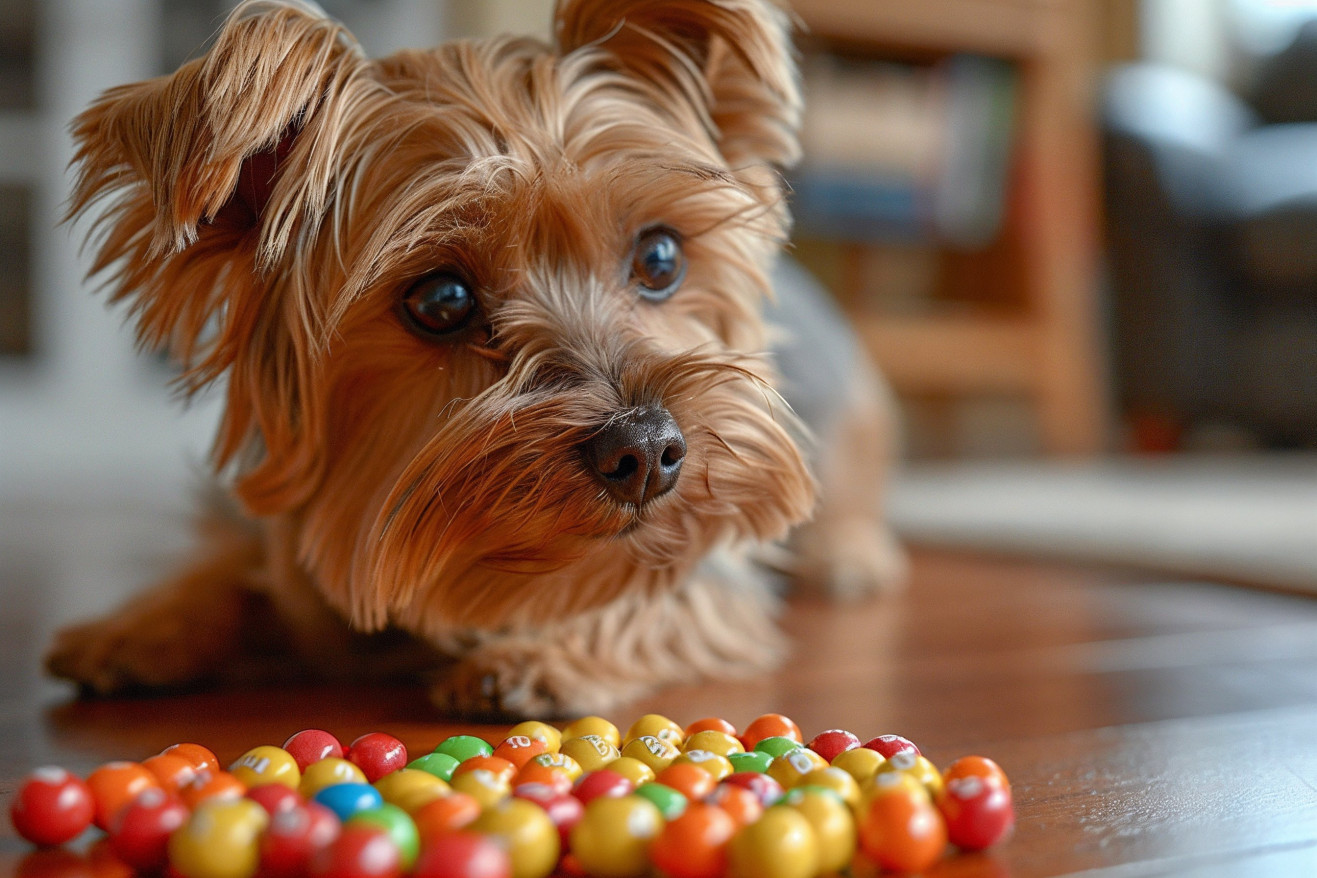Can Dogs Eat Skittles? Understanding the Risks of Sugary Treats
17 February 2024 • Updated 16 February 2024

Your dog has discovered your secret candy stash, but can you share those sweet, chewy Skittles with your furry friend? While Skittles are not poisonous to dogs, they are full of sugar and offer no nutritional benefits to dogs. If dogs eat Skittles, they can experience a range of health issues, from an upset stomach to obesity and diabetes. As a result, it’s best to avoid giving dogs Skittles and other sugary snacks.
In this in-depth review, we’ll look at information from veterinarians and nutrition experts to find out exactly how the ingredients in Skittles and other candies like them can impact dogs.
We’ll also break down the nuances of a dog’s diet, including how the sugars and artificial ingredients found in human snacks can affect your dog’s health. Armed with this knowledge, you’ll be able to make the best choices for your dog’s diet, ensuring they live a long, healthy life.
Can dogs eat skittles?
Know the Sweet Danger: How Sugar Affects Dogs
As with most things in life, the key to sugar and dogs is moderation. While sugar is not toxic to dogs, according to PetMD, it can cause a number of issues including stomach upset, obesity, metabolic changes, diabetes, and pancreatitis. Volhard Dog Nutrition also notes that 25–30% of dogs are obese, and sugar is a contributing factor to the obesity epidemic in dogs.
According to Trupanion, dogs can metabolize the sugars in fruit to some extent, but the processed sugars in Skittles are much harder for dogs to metabolize. This can lead to immediate digestive issues and, in the long term, can contribute to metabolic diseases and tooth decay.
In addition, giving a dog Skittles is especially problematic because they offer no nutritional value, which is not the case with fruit. Fruit has natural sugars, but it also has fiber and water, which help the body absorb the sugar more slowly.
When it comes to our pets, it’s important to remember that while giving a dog a few Skittles as a treat may not seem like a big deal, the long-term impact of sugar on a dog’s health is anything but harmless.
Artificial Sweeteners and How They Affect Dogs
Even if a small bag of Skittles doesn’t have artificial sweeteners in it, it’s important for dog owners to understand the risks these chemicals can present. Xylitol is especially dangerous for dogs because it causes a rapid release of insulin that can lead to life-threatening hypoglycemia and liver failure.
Both the FDA and the American Kennel Club have reported that even small amounts of xylitol can lead to seizures and death in dogs, and it’s often found in sugar-free gum, some candies, and baked goods.
Erythritol, stevia, and monk fruit are all sweeteners that are generally safe for dogs in small amounts, but they can cause stomach upset. Aspartame, which is less risky, is not recommended because it can cause minor stomach upset. It’s important to read labels to make sure that these sweeteners aren’t in the products you’re giving your dog, especially if they’re marketed as sugar-free or low-sugar.
If a dog does consume a sweetener like xylitol, it’s important to get them to a vet immediately. It’s also important to know the signs of poisoning, which can include vomiting, weakness, and tremors. To keep your dog safe, it’s best to avoid artificial sweeteners altogether.
Decoding the Rainbow: The Hidden Dangers of Skittles for Dogs
While Skittles are a popular snack for people, they present a hidden danger for dogs. In fact, each Skittle contains 0.8 grams of sugar, which means that the danger to dogs isn’t just an upset stomach. Regular consumption of these high-sugar treats can lead to obesity, diabetes, and cardiovascular diseases in dogs.
In addition, the corn syrup in Skittles can cause allergic reactions, which can cause symptoms like itching and hair loss in dogs that are sensitive to it.
In addition, MetLife Pet Insurance advises against feeding dogs Skittles and other similar candies because they don’t offer any nutritional benefits and can lead to health problems.
For example, sour Skittles can introduce fruit acids into a dog’s diet, which can cause digestive problems, especially in dogs that have sensitive stomachs. In addition, the sugar that builds up in a dog’s system from eating candy can lead to dental issues like cavities and gum disease, which makes Skittles a bad choice for a dog treat.
Dog owners who want to find a better option for their pets should look for dog treats that are lower in sugar and higher in nutritional value. For example, apples or blueberries can be a sweet option for dogs if they’re given in moderation.
However, it’s important to make sure that the treats you give your dog are specifically formulated for dogs so that you can be sure that you’re giving them a treat that’s not only tasty but also good for their long-term health and well-being.
How Dogs Digest and Metabolize Sugars
To understand why Skittles and other similar products can be harmful to dogs, it’s important to know how dogs digest and metabolize sugars. According to a study posted on ResearchGate, dogs digest sucrose, which is found in Skittles, very well and absorb its glucose and fructose components. However, feeding dogs a diet high in sugar can cause a variety of metabolic issues.
Even though dogs can metabolize sugar, the high glycemic load of candy like Skittles can have a significant impact on their insulin response and glucose metabolism. A study in the Journal of Veterinary Medical Science found that compounds like D-allulose can change blood sugar levels in dogs, which shows that dogs are sensitive to different types of sugar based on their impact on glucose metabolism.
Of particular note, a study from ScienceDirect found that dogs have evolved to digest starches better than their closest wild relatives. Dogs have a higher expression of the AMY2B gene, which is responsible for digesting starch, than wolves.
This evolutionary change suggests that while dogs can handle diets high in starch, the simple sugars in Skittles are a different story, one that doesn’t meet their nutritional needs and can cause health problems if consumed regularly.
Building a Healthy Diet: What Dogs Should Eat
A healthy diet is one of the most important factors in a dog’s overall health. High-quality proteins, which are essential in a dog’s diet, contain important amino acids that are vital for cell growth, repair, and maintenance.
Fats are an energy source and contain important fatty acids that help with cell structure and function. While dogs don’t need carbohydrates, they can be a source of energy and other important nutrients like fiber if they come from whole grains, vegetables, and fruits.
The Wildest explains that vitamins and minerals are also important for a dog’s diet as they help with normal bodily functions, growth, and bone health. For instance, calcium and phosphorus need to be in the right proportions in order to be beneficial. Water is also important but often goes unmentioned, as it helps with hydration and metabolic processes.
On the other hand, WebMD explains that sugary foods like Skittles can lead to obesity, dental issues, and diabetes and don’t provide any nutritional value.
The AKC also warns against human foods that can be dangerous, including those that are high in sugar. Treats should be given in moderation, and The Wildest explains that treats should make up no more than 5–10% of a dog’s diet and should be made from quality ingredients, not the empty calories found in Skittles.
In conclusion, a diet that meets a dog’s nutritional needs is important for their health. Nutritious and safe foods, including lean meats and some fruits and vegetables, can help dogs live long and healthy lives, which is a far cry from the dangers of eating candy.
In Conclusion: Can Dogs Have Skittles?
So, while Skittles themselves aren’t toxic to dogs, they are definitely not a good choice for a dog treat. The sugar content can lead to obesity, dental problems, and even more serious health issues like diabetes and pancreatitis. The artificial sweeteners, especially xylitol, are even more dangerous and can lead to hypoglycemia and liver failure. The other ingredients in Skittles, like acidulants and corn syrup, can cause allergies and don’t offer any nutritional value.
It’s important for dogs to have a healthy, balanced diet to ensure they live long and healthy lives. This means that treats should be chosen with the dog’s diet in mind and should be used to supplement their meals with extra nutrients instead of empty calories. This also means that we should avoid the temptation to share our own treats with our pets, no matter how much they beg.
As pet parents, it’s our responsibility to make informed and compassionate decisions about what we feed our pets. By choosing the right treats and maintaining a healthy diet, we can help our dogs live long, healthy, and happy lives.


